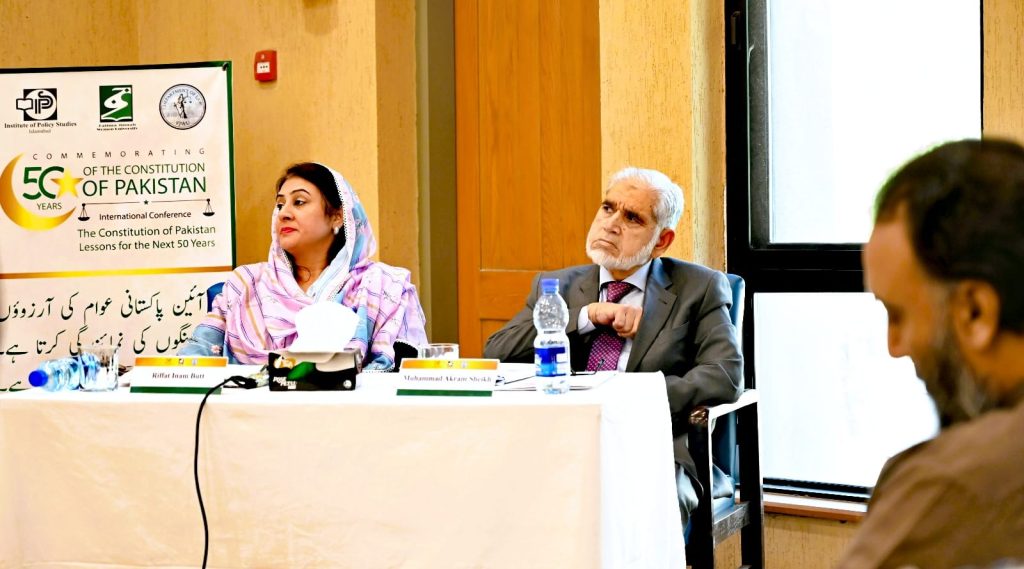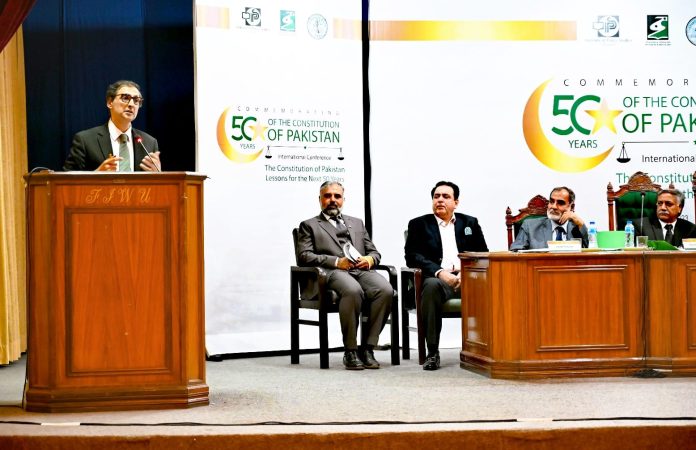dna
Stakeholders urged to harmonize differences post-18th amendment
Islamabad, 19 October: Harmonizing post-18th amendment scenario among federating units and all constitutional stakeholders, which is marred with differences creating numerous governance challenges, in tandem with ensuring timely elections for democratic continuity, remains indispensable for reconciling and preserving the spirit of the 1973 Constitution of Pakistan for a stable and prosperous future of the country.
This was highlighted by veteran statesmen, jurists, and constitutional experts during the inaugural session of the two-day conference on “The Constitution of Pakistan: Lessons for Next 50 Years” co-organized by the Institute of Policy Studies (IPS), Islamabad, and Fatima Jinnah Women University (FJWU), Rawalpindi.

The conference was addressed, among others, by Justice Jawad Hassan, Judge, Lahore High Court, Khalid Rahman, chairman, IPS, Muhammad Akram Shaikh, senior advocate, Supreme Court of Pakistan, Hamid Khan, senior advocate, Supreme Court of Pakistan & author, Haroon-ur-Rashid, vice chairman, Pakistan Bar Council, Ahmer Bilal Soofi, senior advocate, Supreme Court of Pakistan & former federal minister of law, Riffat Inam But, secretary, Law & Justice Commission of Pakistan, Justice Dr Syed Muhammad Anwer, Federal Shariat Court, Dr Tamara Sonn, Georgetown University, Washington DC, Barrister Zafarullah Khan, senior advocate, Supreme Court of Pakistan & former special assistant to PM on law, Ambassador (r) Syed Abrar Hussain, vice chairman, IPS and Professor Dr Fakhr-Ul-Islam, advisor research IPS and former DG, Pakistan Study Centre, University of Peshawar.
“Pakistan’s constitution is one of the best,” remarked Justice Jawad Hassan in his speech as the chief guest of the inaugural session.
He noted that the strength of the constitution is rooted in the will and empowerment of people as enshrined in various articles such as Article 4, ‘the protection of the law’ as the right of the individual, Article 5, the obedience of constitution as ‘the inviolable obligation of every citizen,’ and Article 189, decisions of Supreme Court are binding on other courts.
He further said that, as a guardian of justice and democracy, the 1973 Constitution continues to evolve and adapt to the needs of the nation, and through the role of the judiciary, ensures its people remain empowered and protected.
Khalid Rahman talked about the empowerment of people as a prerequisite to governance. He said that the struggle for empowerment should be against elites and for that education and political awareness must be embedded in national life.
Ahmer Bilal, in his keynote speech, maintained that Pakistan’s constitution serves as a finely balanced institution that united four provincial units and all other diverse groups and regions of the country. This consensus, followed by voluntary following, is an achievement.
However, new challenges emerged after the 18th amendment, emphasizing the need for a more comprehensive and dedicated approach to its enforcement. To address this issue and ensure the continued integrity of the constitution, he stressed that concerted efforts are required to make the 18th amendment work effectively.
Following the inaugural, three sessions were held on three major themes: ‘Constitution and National Integration,’ ‘Democracy and Public Representation,’ and ‘Operationalizing the Constitution: The Role of Executive’, in which multi-disciplinary researchers from more than eight national and three international universities presented 25 papers on various research topics related to the constitution.
Senior statesmen, and constitutional and legal experts addressing the sessions emphasized that providing protection and benefit of fundamental rights through state policies and rules are guarantees for national integration. However, there is a need to make procedural rules to ensure the protection that the law provides. Equally significant is social inclusion in national integration and the consideration of the societal implications of decisions in light of fundamental rights and Principles of Policies.
Furthermore, to ensure the efficient operationalization of the constitution, integration, and the rule of law, state institutions, and executive authorities must practice within their limits as delegated by the constitution.
The speakers also emphasized the importance of the constitution with regard to international relations as it sets the policy guidelines and direction for treaties, agreements, and foreign policy. This is especially important in today’s highly polarized world. #
–

















